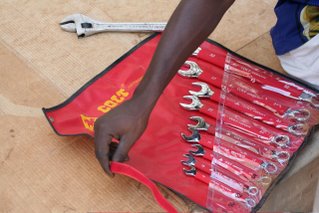This week I was on the 295 bus, Fulham-bound. I was going to have my teeth drilled. Just as the red double-decker turned down towards Battersea, two Somalian women dressed in long head coverings got on the bus, showed their bus passes, and went to walk towards the seats at the back of the bus. I heard the bus driver say something to the women which made them stop by the driver’s cab and say, “What?”, “Are you alright? I don’t think so”, “What’s you problem?”. The women sat down infront of me and grumbled about what the driver had said, apparently something like “Go and sit down” but with a hint of sarcasm. Whatever he said and in whatever way he said it, there was a tension- and it was colour-driven.
I sympathised with the women, smiled to let them know that the bus driver shouldn’t talk to them any differently than he did to me (he just ignored me). I was embaressed that he should be mocking them, felt ashamed even that people can’t get on the bus in London without having comments made about them.
And then I had a flash of what it’s like getting on the bus in Dakar. It’s the same thing. Toubabs (that’s me, white people) are treated differently, sometimes we are charged more, sometimes we get special treatment, sometimes we are teased, sometimes abused, sometimes proposed to. But rarely treated as everyone else is.
I am used to it and I excuse it to myself by saying “I’m a white person (or a foreigner) in someone else’s country, of course I will be treated differently.” Other people, Senegalese people, excuse it saying that it’s not racist, it’s not malicious, it’s just that the Senegalese are used to identifying foreigners as somehow different, whatever their colour and wherever they come from. If I say I don’t like people calling me Toubab as a name (“Oi! Toubab, pass the bus fare”), I am told, “but, it doesn’t mean anything…”. In short, I am, as a white person, never allowed to voice the fact that I am treated differently because of my skin colour. And the reason? Because I am white.
While I was in Europe this Autumn, I had some interesting experiences and conversations with black people about prejudice and racism. During one conversation, in which I was sympathising with a black friend about racist treatment he had received in Europe, I tried to express what it was like being a white person in a black country. I made it quite clear that I didn’t feel our experiences were the same (as one Senegalese friend says, “the difference between you and I is that people treat you differently in Senegal because they think you’re rich, and people treat me differently in France because they think I’m a thief!”). But the fact is that I am judged and treated differently, sometimes negatively, because of my skin colour. The response of my friend shocked me. He refused to let me speak, to let me voice the fact that I too experience racism daily. Because apparently, being white, I wouldn’t know anything about it.
But it seems to me that in England, political correctness is so strong that in general, most white people I know would be scared to even say the word ‘black’ to describe someone. It’s ‘Black-British’, ‘of Nigerian extraction’, ‘with Jamaican parents but brought up in England’, but rarely ‘Black’. If someone says anything that might be perceived as a judgement or assumption on someone’s ethnic origin, a hush will fall. But watch a white person get on a bus in Dakar and watch her be called ‘White’ and told she must pay twice the price because of the fact that she is white, and then watch her be told by her black friends that she’s not even allowed to feel anything about it, because of the fact that she is white, and well, it doesn’t make sense. For centuries, white people have been in control of much of the world’s resources and ruled over much of the world’s population, and done so with brutality, but that has nothing to do with me. I just want to have the freedom to feel something about it when I, too, am judged by the colour of my skin.
*****
A lighter part of my trip to Europe, a walking holiday with my brother in the Appenine Mountains of Italy.

*****
I am on my way back to Dakar. I feel suddenly afraid, desperately wishing a friend was picking me up from the airport, wishing I had something steady and stable to go back, to like a job where I am expected to be from nine till five, under the watchful eye of someone. As it is, I am going back to the freefall of my work, where I am the boss and the worker, and I only work as hard as I make myself.
I’m afraid of the darkness of my street, memories of my mugging coming back. I’m afraid to be so far from my family, from my dog who is sick and I may not see again, afraid that the people I love I may not see again. When I went to London, I didn’t marvel at much. The choice in the shops was exciting for a day or so but that then became commonplace. What surprised me was how much I rely on, and love, my family and friends, and how unhealthy I now feel it is for me to be far from them. I feel like distance is so fragile- so much can happen and so quickly, and it’s best to be close by.






